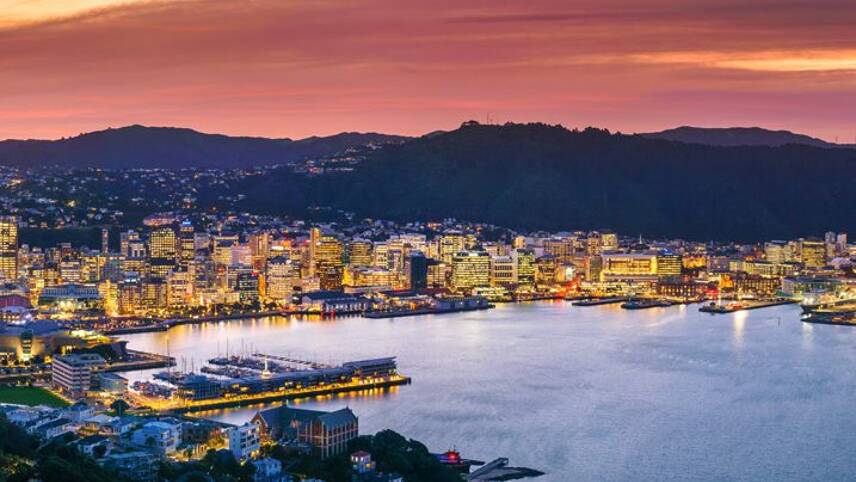Register for free and continue reading
Join our growing army of changemakers and get unlimited access to our premium content

Wellington city and harbour from Mount Victoria
The report from the Coalition for Urban Transitions, supported by 50 leading institutions, found that transforming urban areas into near-zero-emission cities would be worth almost $24trn by 2050. Alongside the economic benefit, the transformation would also reduce urban emissions by 90%, support 87 million jobs annually by 2030, improve air quality, cut traffic levels and improve worker productivity.
“Cities are engines of growth, innovation and prosperity,” said António Guterres, Secretary-General of the United Nations. “This report shows how the right investments can build sustainable and liveable cities and communities that will help us achieve the Sustainable Development Goals and the objectives of the Paris Agreement. It is possible and realistic to realize net-zero urban emissions by 2050. But to get there, we will need the full engagement of city governments combined with national action and support.”
Cities are currently home to more than half of the world’s population, produce 80% of gross domestic product and account for 75% of global carbon emissions. According to the report, investment in low-carbon technology related to building materials, transport and waste infrastructure could deliver half the emissions reductions required to limit global temperature increase to below two degrees.
Cost of inaction
The 90% emissions cut can be delivered whilst creating an economic return, the report notes. Doing so would require an annual investment of $1.8trn (approximately 2% of global GDP), which would generate annual returns worth $2.8trn in 2030, and $7trn in 2050 based on cost savings alone.
The report echoes claims from the chair of the Intergovernmental Panel on Climate Change (IPCC), Dr Hoesung Lee, who has dismissed fears from investors and nations that reaching net-zero emissions will place too much strain on the global economy.
The use of smart technology to create more connected cities would also help reverse deforestation and enhance biodiversity, the report notes. Between 2000 and 2014, urban settlements expanded by an area of land twice the size of Sri Lanka. The added benefit of this, according to the report, is cutting emissions from land use change.
More than 10% of the world’s population – roughly 820 million people – live in coastal zones, which are set to suffer due to rising sea levels. Coastal cities need to be built to be both low-carbon and resilient against a changing climate.
“National governments with the vision to invest in smart, sustainable cities today will see great returns on their investment,” said Lord Nicholas Stern, IG Patel Professor of Economics and Government, London School of Economics.
“Zero-carbon cities will offer countries a competitive advantage as they seek to attract global talent and investment. Countries that do not pursue the transition to zero-carbon cities, on the other hand, face staggering costs of inaction. High-carbon systems will become unprofitable or inoperable as markets and regulations evolve, and the result will be stranded assets and workers left behind as industries fail or relocate.”
Almost 10,000 cities and local governments have regional emission targets in place, but the report warns that these targets aren’t enough to combat climate change in isolation. Instead, the report recommends that the national, local and state governments should work together to cut emissions, which would create more powerful market signals for low-carbon products.
However, a recent study, co-authored by researchers from the University of Cambridge and published by the National Bureau of Economic Research, predicts that average global temperatures will rise by more than 4C by the end of the century, based on current trajectories, and will impact all nations, “whether rich or poor, hot or cold”.
A “business-as-usual” approach to climate mitigation and carbon emissions will see 7% of global GDP disappear by 2100, the report warns, with the UK down’s economy down 4%.
The net-zero transition at edie’s Sustainability Leaders Forum
edie’s Sustainability Leaders Forum returns in 2020, as some of the biggest companies, individuals and organisations championing sustainability gather at the Business Design Centre on 4 & 5 February to discuss the emergency response in transitioning to a net-zero economy.
The flagship, multi-award-winning event features keynotes speakers including Mary Robinson, former President of Ireland; Rebecca Marmot, Unilever CSO; Tom Szaky, TerraCycle CEO; Gilbert Ghostine, Firmenich CEO plus directors and senior managers from Interface, Vattenfall, John Lewis, Taylor Wimpey, Aviva, Pret A Manger, Pernod Ricard, LEGO Group, M&S, Diageo, Tesco, WSP, BASF, Mondelēz and more. For details and to register, visit: https://event.edie.net/forum/
Matt Mace


Please login or Register to leave a comment.